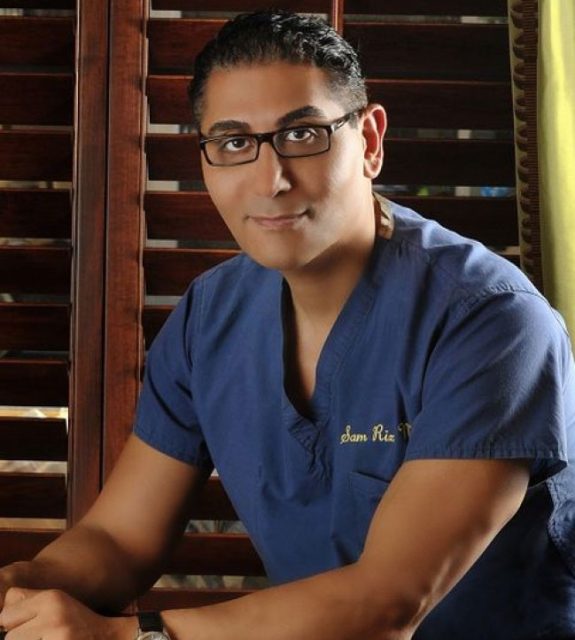Over the years, Dr. Brian Levine has been cited as one of the nation’s leading fertility experts in The New Yorker, New York Post, NBC, CNN, Avenue Magazine among others, offering valuable insight on everything from fertility misconceptions, egg-freezing 101, to how men can boost their fertility. Dr. Levine attended New York University School of Medicine, served as the President of the NYU Alumni Association, and was the only physician on NYU’s Board of Trustees during his 7-year tenure. Recently he was awarded the Meritorious Service Award, the highest award bestowed upon an alumnus for their extraordinary service and continuing devotion to NYU and who embodies the University motto: To Persevere and to Excel. Haute MD Expert, Dr. Brian Levine, gives insight on how to "boost" your fertility when you are having difficulty getting pregnant.
 Photo Credit: ShutterstockAccording to the CDC, about 12% of women aged 15 to 44 years in the United States have difficulty getting pregnant or carrying a pregnancy to term. When seeing patients who are struggling with infertility, they frequently ask what they can do to "boost" their fertility. That conversation quickly gets boiled down into knowing your cycle and limiting your vices.
Photo Credit: ShutterstockAccording to the CDC, about 12% of women aged 15 to 44 years in the United States have difficulty getting pregnant or carrying a pregnancy to term. When seeing patients who are struggling with infertility, they frequently ask what they can do to "boost" their fertility. That conversation quickly gets boiled down into knowing your cycle and limiting your vices.
Here are four high-level points on what we do to help our patients on their path to parenthood:
1. Know your body, know your cycle!
One of the first questions that any fertility doctor will ask is, "Tell me about your cycles." Frequently, patients respond by saying they have "monthly" periods, but are unable to offer any further details. Instead of giving a vague answer, empower your doctor to make a plan tailored to you and your cycle, and offer some insight into how often you get a period, how long you bleed for, any bleeding that you have in-between cycles and any pain or cramps that you experience when you get your period. If this sounds like a lot of information to remember, just know there are tons of apps available that track this data! By telling your doctor about the length, regularity, character, and symptoms of your cycle, you might be able to boost your fertility by finding out simply the right time to have sex!
2. Where there's smoke, there's (a raging) fire!
Most of us are taught at an early age that cigarette smoking can increase our chances of developing cardiovascular disease, lung disease, and even certain types of cancers. However, few (if any) recognize that smoking (cigarettes, cigars, hookahs, marijuana, etc.) can cause infertility! According to the American Society for Reproductive Medicine (ASRM) patient website, ReproductiveFacts.org, "Chemicals (such as nicotine, cyanide, and carbon monoxide) in cigarette smoke speed up the loss rate of eggs. Unfortunately, once eggs die off, they cannot regenerate or be replaced. This means that menopause occurs 1 to 4 years earlier in women who smoke (compared with non-smokers)." We counsel all of our patients, regardless of why they are being evaluated (infertility, egg freezing, sperm freezing, embryo freezing, egg donation, gestational carrier, etc.), that smoking and second-hand smoke (being around someone who smokes), can have long-lasting devastating effects on someone's reproductive potential, and poses strong risks to the fetus should they be pregnant.
 Photo Credit: Shutterstock3. You might need to wait until you are a healthy weight!
Photo Credit: Shutterstock3. You might need to wait until you are a healthy weight!
While obesity has been associated with myriad health complications, we rarely hear in the media about the effects of obesity on infertility. According to the ASRM, obesity is the cause of infertility in nearly 6% of women who have never been pregnant before. For women, obesity throws off the delicate balance of the body's sex hormones, and can also lead to having irregular cycles or not ovulating (releasing an egg) at all. In men, a 2012 JAMA Internal Medicine article reported that excess fat can lease to elevated core body temperature, especially around the scrotum, ultimately leading to suboptimal hormones and altered sperm parameters and performance. In short, for the couple that struggles with their weight, stress eating might become a Band-Aid, and unfortunately, worsening the problem. So, when patients are not at their ideal weight, we advise them to adopt a healthier lifestyle, use exercise as a stress reliever, and limit the carbs and candy. When people look better, they feel better, and when they feel better, they are ready to tackle whatever is thrown at them!
4. When is one more drink one too many?
In a 2015 National Survey on Drug Use and Health (NSDUH), it was found that more than 85% of people age 18 or older reported alcohol consumption at some point in their lives, and 56% reported drinking in the past month. Let's face it, alcohol is a relatively cheap and widely available stress reliever for many. While it would never be ethical to design a study to prospectively see how many drinks it takes to alter someone's fertility, there has been considerable retrospective research (patient-reported), where we have learned about the devastating impact of alcohol. For those undergoing IVF, a 2011 study estimated that "consumption of as few as four alcoholic drinks per week is associated with a decrease in IVF live birth rate." For men, a study of more than 8000 men from Europe and the USA found that "moderate alcohol intake is not adversely associated with semen quality in healthy men." But, the authors caution that moderate alcohol intake can have a lasting impact on the health of men. Taken together, there is no safe amount of alcohol, so when in doubt, cut it out!
For more information, visit Dr. Brian A. Levine's social media:






















